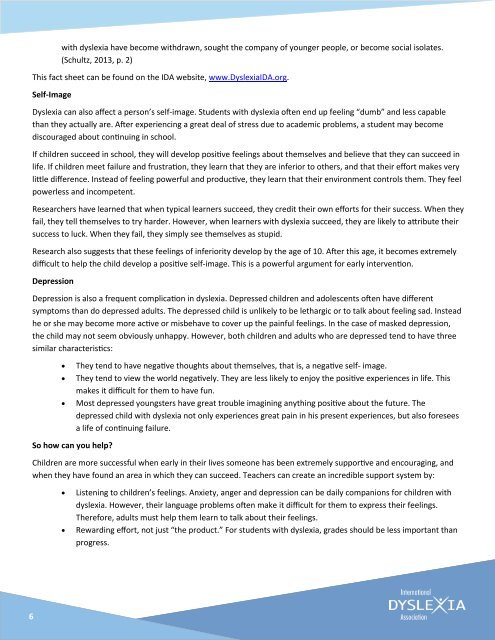Overcoming Dyslexia
Overcoming Dyslexia
Overcoming Dyslexia
You also want an ePaper? Increase the reach of your titles
YUMPU automatically turns print PDFs into web optimized ePapers that Google loves.
with dyslexia have become withdrawn, sought the company of younger people, or become social isolates.<br />
(Schultz, 2013, p. 2)<br />
This fact sheet can be found on the IDA website, www.<strong>Dyslexia</strong>IDA.org.<br />
Self-Image<br />
<strong>Dyslexia</strong> can also affect a person’s self-image. Students with dyslexia often end up feeling “dumb” and less capable<br />
than they actually are. After experiencing a great deal of stress due to academic problems, a student may become<br />
discouraged about continuing in school.<br />
If children succeed in school, they will develop positive feelings about themselves and believe that they can succeed in<br />
life. If children meet failure and frustration, they learn that they are inferior to others, and that their effort makes very<br />
little difference. Instead of feeling powerful and productive, they learn that their environment controls them. They feel<br />
powerless and incompetent.<br />
Researchers have learned that when typical learners succeed, they credit their own efforts for their success. When they<br />
fail, they tell themselves to try harder. However, when learners with dyslexia succeed, they are likely to attribute their<br />
success to luck. When they fail, they simply see themselves as stupid.<br />
Research also suggests that these feelings of inferiority develop by the age of 10. After this age, it becomes extremely<br />
difficult to help the child develop a positive self-image. This is a powerful argument for early intervention.<br />
Depression<br />
Depression is also a frequent complication in dyslexia. Depressed children and adolescents often have different<br />
symptoms than do depressed adults. The depressed child is unlikely to be lethargic or to talk about feeling sad. Instead<br />
he or she may become more active or misbehave to cover up the painful feelings. In the case of masked depression,<br />
the child may not seem obviously unhappy. However, both children and adults who are depressed tend to have three<br />
similar characteristics:<br />
<br />
<br />
<br />
They tend to have negative thoughts about themselves, that is, a negative self- image.<br />
They tend to view the world negatively. They are less likely to enjoy the positive experiences in life. This<br />
makes it difficult for them to have fun.<br />
Most depressed youngsters have great trouble imagining anything positive about the future. The<br />
depressed child with dyslexia not only experiences great pain in his present experiences, but also foresees<br />
a life of continuing failure.<br />
So how can you help?<br />
Children are more successful when early in their lives someone has been extremely supportive and encouraging, and<br />
when they have found an area in which they can succeed. Teachers can create an incredible support system by:<br />
<br />
<br />
Listening to children’s feelings. Anxiety, anger and depression can be daily companions for children with<br />
dyslexia. However, their language problems often make it difficult for them to express their feelings.<br />
Therefore, adults must help them learn to talk about their feelings.<br />
Rewarding effort, not just “the product.” For students with dyslexia, grades should be less important than<br />
progress.<br />
6

















